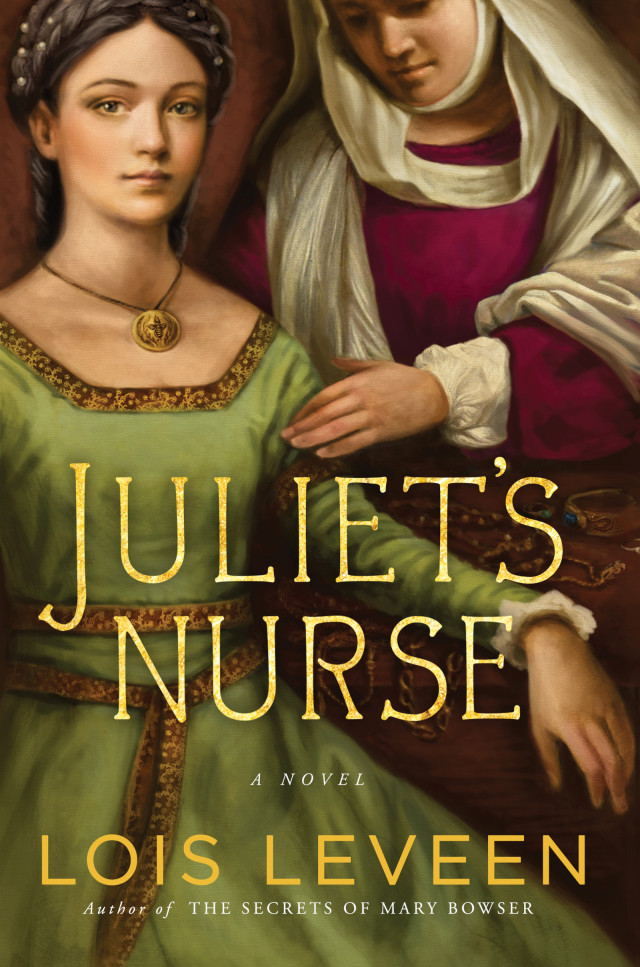Lois Leveen on Rewriting ‘Romeo and Juliet’ in 'Juliet's Nurse'

Now Leveen reaches further back with her second novel, Juliet’s Nurse, to retell the time-told tale of Romeo and Juliet from the perspective of the stalwart (and surprisingly bawdy) nurse, riffing off the Bard’s dialogue along the way. “It’s only fair: Shakespeare ripped off all his best ideas from other people anyway,” Leveen tells us.
But to create the narrative, the self-described research hound had to dive into the history of Italy in the 14th century, an era before printing presses, learning all sorts of obscure, and now seemingly absurd, ideas about sex, birth, death, and everything in between.
To explore some of the historical elements that end up shaping her story, we decided to play a game. I picked five pages at random, and she explained how they came about.

P. 62
Portland Monthly: Let’s start out with something that will probably shock readers most: the nurse is super randy. In this passage, she sneaks her husband, Pietro, into Juliet’s room for a quickie.
Lois Leveen: Up until about the 18th century, women were considered much more sexually aggressive than men. Some of it comes from this idea of the fall of Eve. But also the idea of humors, and that women were essentially considered less able to control themselves and more likely to give in to lust, where men could be more logical and in control—which is totally the opposite of what we have in our culture. The Catholic Church believed that people lived in their bodies and they are going to sin; it takes the Protestant Revolution to get the idea that desire should be repressed.
We know she had a husband who was a merry man. In the play she tells the story of how when Juliet was being weaned, there’s an earthquake. Juliet falls and hits her head, and her husband picks up Juliet and says, “you’ve fallen upon your face, but when you’re a woman, you’ll fall upon your back for a man,” which is a weird sex joke to make about a 3-year-old.
All we know in the play is that he makes that raunchy joke, and that he’s dead. Everything else I made up.
P. 106
Here, the nurse talks about losing teeth after getting caught in a major brawl, while baby Juliet starts to have her teeth grow in.
Part of what I’m trying to show with the brawl is: medieval cities were incredibly violent. There used to be street fighting in Florence where there would be 500 adolescent boys—they might be teenagers or in their early 20s—but 500 on each side, fighting. That’s crazy. How do you even know who is on your side?
I think in Romeo and Juliet, people don’t get why the families are having feuds. Part of it is that was just so much a part of the culture and city life.
And in the play she talks about not having any teeth, so I had to knock some teeth out along the way.
Lois Leveen reads from Juliet's Nurse
Broadway Books
Oct 28 at 7 pmP. 136
During the plague, the nurse’s boys leave the house, where she’s confined them, to get into a little mischief, and in the process they all get infected.
One of the things in trying to figure out when the play was set, Mercutio says not one once, not twice, but three times, “A plague on both your houses.”
The plague came to Italy in 1348, and it killed 40 percent of the population. This has been really weird to think about while the Ebola outbreak is happening because we know so much about disease, but if 40 percent of the population here died, we would be totally freaked out.
One of the biggest pieces of backstory that we get about the nurse is that her sons died of the plague. This is the moment we see what that was like for her and get a sense of the horror of being in something so deadly and knowing that it’s going to take your children.
Poor kids: I kill six of them at once.
P. 278
This is where Juliet first tells the nurse about meeting Romeo.
This is a big question: why does she help Juliet hook up with Romeo. What’s the nurse’s motivation?
The idea that Juliet could be pursuing whoever is interested in her is a strange thing because marriages then would be arranged as alliances between families. But if your family is not rich, you didn’t fall into that, because there wasn’t anything riding on it. So Juliet is more constrained than the nurse would’ve been.
So in some ways she decides she’s going to see Juliet as being like her and Romeo as being like Pietro, and that makes her want to give them a love match that they’re not supposed to have. So it’s this strange moment of the nurse realizing that they’re going to have to sneak around together so that Juliet can have this opportunity.
Before we go, can you say a little about the challenge of marrying Shakespeare’s language with yours?
That’s the hardest part. The lines are so well known, but people coming to this want to read something that feels acceptable as a novel reader. I mostly don’t use Shakespeare’s language. I have a couple cheats. I decided to not use any contractions that Shakespeare does not use. You would say, “I don’t use any contractions.” But Shakespeare would say, “I would not,” or “she would not.” Things where I could get at the flavor of Shakespeare without having to sound like Shakespeare.
I have a certain fondness with Shakespeare’s Star Wars, which makes C3PO and Luke Skywalker talk Shakespeare, and it’s really charming, but that’s all that is.
But it needed to do more. I needed to make a story that someone who doesn’t like Shakespeare could still fall in love with.
Read an excerpt from Juliet's Nurse.




